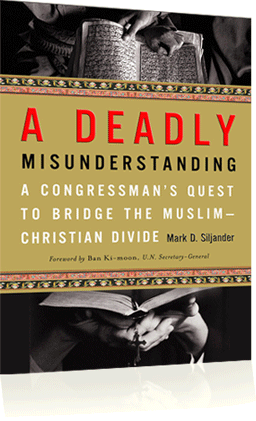We emerged and stood for a moment, blinking under the glare of the Mideastern sun and chatting with our Israeli security guard, when suddenly a shot rang out.Mark
Siljander With its glamorous history, mix of European and Arab influences and liberal, cosmopolitan culture, Beirut had once been known as “the Paris of the Mideast.” But those days were long past. There was no mistaking the street where I stood: we were in the center of a war zone. It was the fall of 1982. Israeli troops were poised all along the country’s southern border, ready to go in and wipe out the Palestinians who were dug in along that same border and determined to repel the Israelis at any cost. It was a standoff ready to explode at the smallest spark. I had just spent an hour visiting Camille Chamoun, the eighty-two-year-old Christian former president of Lebanon, hoping to get his read on the situation. The conversation had been inconclusive. Chamoun’s house was located on the Christian side of the barren strip of scorched earth that divided Beirut into its two warring, irreconcilable halves: East and West, Muslim and Christian. The desolate strip of land had been dubbed, with an irony I’m sure nobody intended, the Green Line. I’d never seen anything less fertile, less evocative of life, less green, than this parched place. We emerged and stood for a moment, blinking under the glare of the Mideastern sun and chatting with our Israeli security guard, when suddenly a shot rang out. I should have ducked, but instead I froze. This was only my second trip to the Mideast, and I hadn’t yet acquired the war-zone reflexes that would come in the years to follow. Like a carpenter’s calluses or coal miner’s cough, a kind of hair-trigger vigilance comes with the territory, part and parcel of the seasoned diplomat’s trade. In central Africa, you learn how to cope with mosquitoes: in Beirut, you learn how to duck bombs and bullets. But as a freshman congressman just learning the ropes, I was pretty green myself, and I was still staring dumbly at the rubble-strewn streets, looking vaguely for the source of the sound when I was grabbed and yanked roughly to the ground—and a sharp pinnnggg! rang out, tearing a small cloud of dust from the wall just inches from where my head had been. The young Israeli dragged me ten or fifteen feet to a bus, pitched me in, and jerked the door closed. Palestinian snipers were closing in. With the sound of my heartbeat pumping in my ears, one thought flooded through my racing brain: What the hell am I doing here? |

